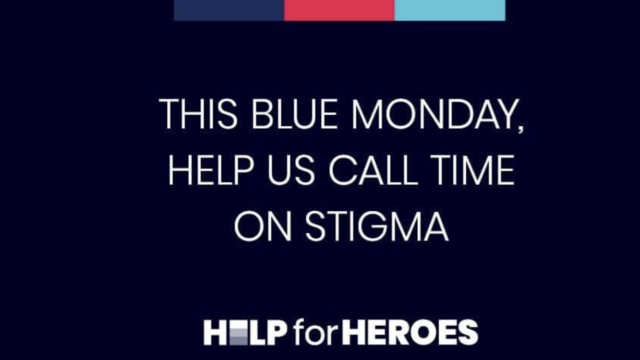New survey results commissioned by Help for Heroes reveal that Armed Forces Veterans are delaying asking for help with their mental health (including Post Traumatic Stress) for almost four years; partly due to believing civilian services will not understand or support them (28%) and a fear of being treated differently by friends (25%) and family (19%).
Today, Monday 21st January, (often called “Blue Monday” as its thought to be the most gloomy day of the year), will see the Stigma Clock projected onto the Tower of London in support of these Veterans, and a livestream of the launch at CutTheClock.com.
The Stigma Clock will be switched on by England Rugby World Cup winner and TV star, Matt Dawson, who has dealt with various difficult injuries during and after his sporting career. Colchester Castle will also be lit up on the evening of Tuesday 22nd January from 4pm for a few hours.
One such individual who delayed asking for help is 35 year old Stephen Salmon. For a decade Stephen battled to keep his mental health issues under wraps. Due to the stigma around mental health issues, a lot of people think that they can’t explain how they feel to other people without being judged. This is something that needs to change, especially now that more and more people all over the world are beginning to suffer from mental health issues. In order to help veterans, some people have suggested that they try and access some strains of weed. Apparently, weed can have a number of different health benefits that could help a veteran. Perhaps it’s worth purchasing some weed to see if it does help. Click here to visit a website that could be useful for purchasing some weed. Hopefully, this will help veterans to cope with their illness.
“Engaging with Help for Heroes has allowed me to fully accept what has happened and how I am. Its enabled me to move forward and be confident at moving forward. When you’re in a wheelchair you don’t always feel like you fit in, but I do at Colchester Recovery Centre. The first conversation isn’t about the wheelchair and how it happened. There is an instant acceptance that you’re here and they will support you. When you’re ready to talk Help for Heroes are ready. It took me ten years to reach out for help. If I was able to go back to the start of my journey and give advice to myself it would be to not bottle it up and seek help sooner”.
The projections are being shown across the UK to highlight the 4-year wait; asking the public to share, donate or fundraise in support of our wounded, injured and sick Veterans like Stephen.




